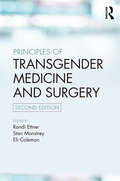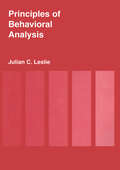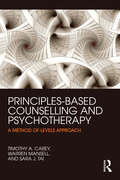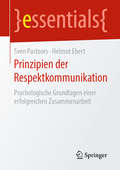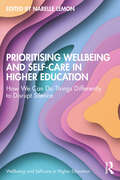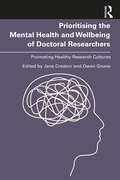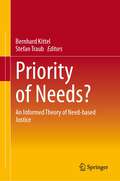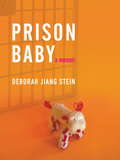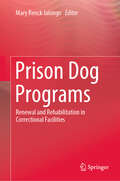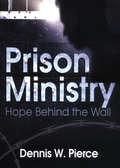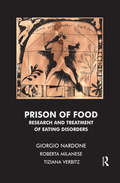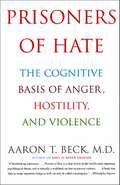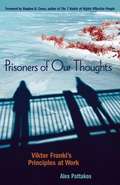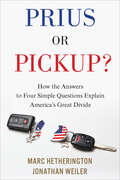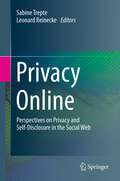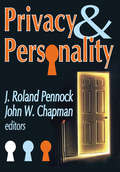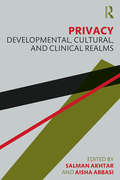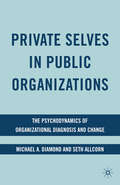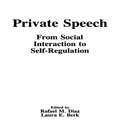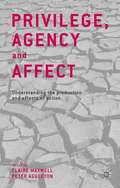- Table View
- List View
Principles of Transgender Medicine and Surgery
by Randi Ettner Stan Monstrey Eli ColemanA practical guide to state-of-the-art treatments and health care knowledge about gender diverse persons, this second edition of Principles of Transgender Medicine and Surgery presents the foremost international specialists offering their knowledge on the wide spectrum of issues encountered by gender diverse individuals. In this handy text, professionals of all types can get important information about various aspects of transgender health care for a full spectrum of clients, from childhood to advanced age. Key topics addressed include medical and surgical issues, mental health issues, fertility, the coming out process, and preventive care. This essential text is extensively referenced and illustrated, and instructs both novice and experienced practitioners on gender-affirming care.
Principles of behavioural analysis
by LeslieFirst published in 1996. Routledge is an imprint of Taylor & Francis, an informa company.
Principles of the Enneagram: What it is, how it works, and what it can do for you Second Edition
by Karen WebbStill the definitive introduction to the Enneagram, this revised and updated edition covers all the key information on this curiously accurate system of knowledge about human personality. From its historical roots to how to use it in everyday life, the book encompasses all of the key aspects and principles of the subject. It explains the nine personality types, how they interrelate and how to recognise and understand your own and others' basic types. It also explores how the model can provide a lifelong guide that will encourage personal and spiritual growth, helping you to work with your personality's strengths and weaknesses to realise your true potential. The perfect introduction to a timeless topic, this book will be of interest to anyone who wants to understand more about the Enneagram, whether for personal application or general interest.
Principles-Based Counselling and Psychotherapy: A Method of Levels approach
by Warren Mansell Timothy A. Carey Sara TaiMany current approaches to the treatment of psychological problems focus on specific disorders and techniques that are purported to be effective and distinct. Recent advances in knowledge and theory, however, have called into question this approach. The conceptual framework of transdiagnostic, rather than disorder specific, processes is gaining traction. Alongside this has been the call to focus on evidence-based principles rather than evidence-based practices and techniques. The rationale behind this is that many apparently unique and innovative practices are usually the reflection of common underlying principles. This book describes three foundational principles that are key to understanding both the rise and the resolution of psychological distress. Principles-Based Counselling and Psychotherapy promotes a Method of Levels (MOL) approach to counselling and psychotherapy. Using clinical examples and vignettes to help practitioners implement a principles-based approach, this book describes three fundamental principles for effective therapeutic practice and their clinical implications. The first chapter of the book provides a rationale for the principles-based approach. The second chapter describes the three principles of control, conflict, and reorganisation and how they relate to each other from within a robust theory of physical and psychological functioning. The remainder of the book covers important aspects of psychological treatment such as the therapeutic relationship, appointment scheduling, and the change process from the application of these three principles. With important implications for all therapeutic approaches, Principles-Based Counselling and Psychotherapy will be an invaluable resource for psychotherapists, counsellors and clinical psychologists in practice and training. It provides clarity about their role, and a means for providing a resolution to psychological distress and improving the effectiveness of their practice.
Prinzipien der Respektkommunikation: Psychologische Grundlagen einer erfolgreichen Zusammenarbeit (essentials)
by Helmut Ebert Sven PastoorsDieses essential erläutert anhand praxisorientierter Beispiele die Prinzipien der Respektkommunikation. Es konzentriert sich dabei auf die vier Bereiche Selbstrespekt, Kommunikation, Integration und Mitarbeiterführung. Diese Prinzipien helfen den Lesern, ihre Ziele souverän und respektvoll zu erreichen. Gleichzeitig können sie mit diesen Prinzipien verhindern, dass die eigene Verwirklichung auf Kosten anderer erfolgt und so zu immer kurzfristigeren Erfolgen in den genannten Bereichen führt.
Prioritising Wellbeing and Self-Care in Higher Education: How We Can Do Things Differently to Disrupt Silence (Wellbeing and Self-care in Higher Education)
by Narelle LemonThis book illuminates international voices of those who feel empowered to do things differently in higher education, providing inspiration to those who are seeking guidance, reassurance, or a beacon of hope.Doing things differently comes with an awareness and curiosity to explore what can be. Increasingly, more and more professionals in higher education are choosing themselves, happiness, families, relationships, kindness, and compassion over arbitrary notions of institutional prestige, continuous pressure to overwork, and competitiveness with others. The chapters in this book do more than highlight flaws in the system, they call for proactive engagement in interrupting and reimagining what is broken. The authors share their own experiences as a way of encouraging readers to take small steps towards self-care, to notice their surroundings, and to embrace change as an empowering tool. The focus is on becoming the change we aspire to see, with a collective readiness to instigate positive transformations.Sharing ambitious ideas to encourage change, this book is a valuable resource for those seeking to enhance their self-care and wellbeing in the higher education context, and for those seeking to engage with others in support of these efforts.
Prioritising the Mental Health and Wellbeing of Doctoral Researchers: Promoting Healthy Research Cultures
by Owen Gower Jane CreatonDrawing on academic research and practitioner expertise, this essential volume provides a multidisciplinary and cross-institutional perspective on postgraduate researcher mental health and wellbeing in order to support academic and professional staff in the higher education sector.Contributing authors unpack the key debates, issues and initiatives within higher education policy and practice, while also considering wider contextual factors that may impact upon the mental health of researchers. Readers are encouraged to recognise the importance of belonging throughout and to understand how we may promote healthy research cultures by fostering connections and community.A crucial read for anyone working with doctoral students or involved higher education policy, this edited collection provides a new contribution to research within the field, bettering our understanding of the mental health of postgraduate researchers by drawing from a range of perspectives.
Priority of Needs?: An Informed Theory of Need-based Justice
by Bernhard Kittel Stefan TraubThis book develops an empirically informed normative theory of need-based justice, summarizing core findings of the DFG research group FOR2104 “Need-based Justice and Distributive Procedures”. In eleven chapters scholars from the fields of economics, political science, philosophy, psychology, and sociology cover the identification and rationale of needs, the recognition and legitimacy of needs, the dynamics and stability of procedures of distributions according to needs, and the consequences and sustainability of need-based distributions. These four areas are studied from the perspective of two mechanisms of need objectification, the social objectification by the discursive generation of mutual understanding (transparency) and the factual objectification by the transfer of decisions to uninvolved experts (expertise). The volume addresses academics in the fields of justice research, ethics, political theory, social choice and welfare, framing, individual and group decision making, inequality and redistribution, as well as advanced students in the contributing disciplines.
Prison Baby
by Deborah Jiang SteinA deeply personal and inspiring memoir recounting one woman's struggles--beginning with her birth in prison--to find self-acceptance Prison Baby is a revised and substantially expanded version of Deborah Jiang Stein's self-published memoir, Even Tough Girls Wear Tutus. Even at twelve years old, Deborah, the adopted daughter of a progressive Jewish couple in Seattle, felt like an outsider. Her mixed Asian features set her apart from her white, well-intentioned parents who evaded questions about her past. But when she discovered a letter revealing the truth of her prison birth to a heroin-addicted mother--and that she spent the first year of life in prison--Deborah spiraled into emotional lockdown. For years she turned to drugs, violence, and crime as a way to cope with her grief. Ultimately, Deborah overcame the stigma, shame, and secrecy of her birth, and found peace by helping others--proving that redemption and acceptance are possible even from the darkest corners.From the Trade Paperback edition.
Prison Dog Programs: Renewal and Rehabilitation in Correctional Facilities
by Mary Renck JalongoThis edited volume brings together a diverse group of contributors to create a review of research and an agenda for the future of dog care and training in correctional facilities. Bolstered by research that documents the potential benefits of HAI, many correctional facilities have implemented prison dog programs that involve inmates in the care and training of canines, not only as family dogs but also as service dogs for people with psychological and/or physical disabilities. Providing an evidence-based treatment of the topic, this book also draws upon the vast practical experience of individuals who have successfully begun, maintained, improved, and evaluated various types of dog programs with inmates; it includes first-person perspectives from all of the stakeholders in a prison dog program—the corrections staff, the recipients of the dogs, the inmate/trainers, and the community volunteers and sponsors Human-animal interaction (HAI) is a burgeoning field of research that spans different disciplines: corrections, psychology, education, social work, animal welfare, and veterinary medicine, to name a few. Written for an array of professionals interested in prison dog programs, the book will hold special interest for researchers in criminal justice and corrections, forensic psychology, and to those with a commitment to promoting the ideals of rehabilitation, desistance thinking, restorative justice, and re-entry tools for inmates.
Prison Food: Identity, Meaning, Practices, and Symbolism in European Prisons (Palgrave Studies in Prisons and Penology)
by An-Sofie VanhoucheBased on the lived experiences of incarcerated persons and staff, this book explores the symbolic significance of prison foodways to normalization, autonomy, identity construction, power, group formation and security. The book also traces the rationalization(s) that policy makers attach to prison food, from the water and bread diet of the 18th century, the contested abolition of alcohol consumption, to the current fear surrounding the spread of COVID-19 through food distribution in prisons. The argument is developed that prison food policies have always reflected how Belgian governments have treated imprisoned persons. The emphasis on Belgian prisons and the discussions on prison foodways situated on a micro and macro level add a unique flavour to prison food scholarship by providing a deeper understanding of a penal culture outside the dominant tradition of Anglo-Saxon and Nordic studies. Consequently, the book provides a nuanced conception of prison foodways for penologists, sociologists, those with interests in wider prison policy, and those working on the socio-cultural role of food in closed environments.
Prison Ministry: Hope Behind the Wall
by Dennis W. PierceShow the incarcerated how to find forgiveness in unforgiving surroundingsAs the prison population in the United States increases by more than 1,000 inmates each week, prison ministry programs must have a working blueprint for dealing with the shame, humiliation, hate, and loneliness of incarceration at both the adult correctional and juvenile detention/probation levels. Prison Ministry: Hope Behind the Wall demonstrates how a ministry can adapt Latin American Liberation theology to address oppression and bring prisoners into the community of Christ. Author Dennis Pierce, former chaplain at the Joliet Correctional Center in Illinois (where the Fox Network's 2005 "Prison Break" series is filmed), presents a functioning approach to forgiveness and reconciliation, combining pastoral counseling, Christian education, Bible studies, and worship to help inmates develop self-esteem and an overall feeling of self-worth through compassion and empathy. Prison Ministry: Hope Behind the Wall provides an alternative resource on our prison system for chaplains, pastors, priests, and students working in theology, ethics, or counseling. Instead of the usual descriptive narratives of inmates&’ lives or discussions of statistical approaches, this unique book combines a theological model with a viable programmatic approach to confront the oppression of incarceration and reverse its effects. The book looks at the vital issues facing juveniles in the criminal justice system (the transition from county jail to a correctional facility, victimization, rejection, under-stimulation, homosexual rape) and examines the creation of non-threatening niches to address coping structures needed to move toward forgiveness and reconciliation. Prison Ministry: Hope Behind the Wall examines: meeting the incarcerated defining prison&’s emotional ethos dealing with human breakdowns oppression in maximum-security prison components of empowerment needed for prison ministry Prison Ministry: Hope Behind the Wall also includes case studies of four inmates, an extensive bibliography, a glossary of prison terms, sample Bible studies, and sermon topics. The book is invaluable for anyone dealing with incarcerated youth and young adults in civilian or military correctional or juvenile detention facilities.
Prison of Food: Research and Treatment of Eating Disorders
by Giorgio Nardone Tiziana Verbitz Roberta MilaneseThis groundbreaking volume concentrates on solution-oriented treatment of some of the most difficult pathologies - anorexia, bulimia and vomiting (as a separate category introduced by Nardone et al). The logic and apparent simplicity of the way these complex conditions are treated is truly outstanding. As opposed to a long-drawn psychotherapy, Nardone and his colleagues offer a relatively short period of treatment, consisting of dialogue between the patient and the therapist, and sometimes the patient's family. The patient is also given some "homework" to do in-between the sessions. Rather than looking at the "why" of the situation, this approach looks at "how" the problem manifests itself and what can be done about it. The book starts by outlining the pathologies and the logic behind this type of brief therapy. It then moves on to examine particular case studies and the reader gets immersed in the fascinating dialogue between the therapist and the client.
Prisoners Of Hate: The Cognitive Basis of Anger, Hostility, and Violence
by Aaron T. Beck"Prisoners of Hate offers a profound analysis of a most pressing human challenge: the causes—and prevention—of hatred. Of the many important books Aaron Beck has written, this may be his greatest gift to humanity." —Daniel Goleman, author of Emotional IntelligenceWorld-renowned psychiatrist Dr. Aaron T. Beck has always been at the forefront of cognitive therapy research, his approach being the most rapidly growing psychotherapy today. In his most important work to date, the widely hailed father of cognitive therapy presents a revolutionary look at destructive behavior—from domestic abuse to genocide to war—and provides a solid framework for remedying these crucial problems. In this book, Dr. Beck:Illustrates the specific psychological aberrations underlying anger, interpersonal hostility, ethnic conflict, genocide, and war;Clarifies why perpetrators of evil deeds are motivated by a belief that they are doing good;Explains how the offenders are locked into distorted belief systems that control their behavior and shows how the same distortions in thinking occur in a rampaging mob as in an enraged spouse;Provides a blueprint for correcting warped thinking and belief systems and, consequently, undercutting various forms of hostility; andDiscusses how the individual and society as a whole might use the tools of psychotherapy to block the psychological pathways to war, genocide, rape, and murder.
Prisoners of Our Thoughts: Viktor Frankl's Principles for Discovering Meaning in Life and Work
by Alex PattakosHow do I find meaning in my life? How can I find meaning in my work? World-renowned psychiatrist Viktor Frankl's "Man's Search for Meaning" is one of the most important books of modern times.
Prius Or Pickup?: How the Answers to Four Simple Questions Explain America's Great Divide
by Marc Hetherington Jonathan Weiler“In this fascinating look at contemporary politics, [the authors] set out to explain what really causes the extreme political polarization seen today.” —Publishers WeeklyWhat’s in your garage: a Prius or a pickup? What’s in your coffee cup: Starbucks or Dunkin’ Donuts? What about your pet: cat or dog? As award-winning political scholars Marc Hetherington and Jonathan Weiler explain, even our smallest choices speak volumes about us—especially when it comes to our personalities and our politics. Liberals and conservatives seem to occupy different worlds because we have fundamentally different worldviews: systems of values that can be quickly diagnosed with a handful of simple questions, but which shape our lives and decisions in the most elemental ways. If we’re to overcome our seemingly intractable differences, Hetherington and Weiler show, we must first learn to master the psychological impulses that give rise to them, and to understand how politicians manipulate our mindsets for their own benefit.Drawing on groundbreaking original research, Prius or Pickup? provides the psychological key to America’s deadlocked politics, showing that we are divided not by ideologies but something deeper: personality differences that appear in everything from politics to parenting to the workplace to TV preferences, and that would be innocuous if only we could decouple them from our noxious political debate. “A fascinating way to look at the fracturing of a nation.” —Kirkus Reviews“An exceptionally insightful and entertaining exploration of the roots of tribalism in American (and European) society and politics, and its ominous consequences for democracy.” —Thomas E. Mann, Senior Fellow, Brookings Institution
Privacy Online
by Sabine Trepte Leonard ReineckeCommunications and personal information that are posted online are usually accessible to a vast number of people. Yet when personal data exist online, they may be searched, reproduced and mined by advertisers, merchants, service providers or even stalkers. Many users know what may happen to their information, while at the same time they act as though their data are private or intimate. They expect their privacy will not be infringed while they willingly share personal information with the world via social network sites, blogs, and in online communities. The chapters collected by Trepte and Reinecke address questions arising from this disparity that has often been referred to as the privacy paradox. Works by renowned researchers from various disciplines including psychology, communication, sociology, and information science, offer new theoretical models on the functioning of online intimacy and public accessibility, and propose novel ideas on the how and why of online privacy. The contributing authors offer intriguing solutions for some of the most pressing issues and problems in the field of online privacy. They investigate how users abandon privacy to enhance social capital and to generate different kinds of benefits. They argue that trust and authenticity characterize the uses of social network sites. They explore how privacy needs affect users' virtual identities. Ethical issues of privacy online are discussed as well as its gratifications and users' concerns. The contributors of this volume focus on the privacy needs and behaviors of a variety of different groups of social media users such as young adults, older users, and genders. They also examine privacy in the context of particular online services such as social network sites, mobile internet access, online journalism, blogs, and micro-blogs. In sum, this book offers researchers and students working on issues related to internet communication not only a thorough and up-to-date treatment of online privacy and the social web. It also presents a glimpse of the future by exploring emergent issues concerning new technological applications and by suggesting theory-based research agendas that can guide inquiry beyond the current forms of social technologies.
Privacy and Personality
by Russell L. CiochonLike many concepts, privacy has a commonly accepted core of meaning with an indefinite or variable periphery. Some would wish to enlarge the core. It would be pointless to attempt to establish a definition by way of introduction to a series of essays that themselves provide no single definition. But the themes of freedom, justice, rational choice, and community always seem to appear in any discussion of privacy. Privacy is a penultimate good. Perhaps, in certain usages--such as autonomy--it is an ultimate good, desirable for its own sake and grounded on nothing more final. Of course, the right of privacy may sometimes be asserted to conceal illegal or immoral acts. When that occurs, it appears to be put to an instrumental use. But, insofar as we justify such claims, it is not because they prevent the detection of immorality or violations of the law. Rather, at least in the case of illegal acts, it is because the means being challenged themselves violate privacy.The individual control-human dignity foundation for privacy, is closely related to personality. Privacy provides relief from tension and opportunity for the development of intimate relations with others. All of us have standards of behavior that are higher than we can maintain at all times, and these standards are widely shared in the society in which we live. If we do not observe them we are likely to be criticized, or we fear that we shall be, and we suffer also from loss of self-esteem. Whether in some final sense the concept of privacy is culture bound is impossible to establish, in the absence of any known society in which elements of privacy are not to be found.
Privacy: Developmental, Cultural, and Clinical Realms
by Salman Akhtar Aisha AbbasiIn this, the latest in a series of books examining emotional states and psychological life, Salman Akhtar and Aisha Abbasi critically discuss a concept that remains, appropriately perhaps, elusive and hard to define: privacy. Overlapping with ideas of solitude, secrecy, and anonymity, the concept of privacy poses several crucial questions for analysts. How do our ideas of privacy evolve from childhood through adolescence to adulthood, for example, and when does the need for privacy become morbid and psychopathological? How is privacy conceived differently in different cultures and sub-cultures? Investigating the tension between anonymity and self-disclosure, the book also assesses the challenges posed to clinical privacy, as well as the analyst’s own privacy, by the impact of social media and the wider digital age. Privacy: Developmental, Cultural, and Clinical Realms represents an important contribution to psychoanalytic literature. It will be of great interest to psychoanalysts and psychotherapists in practice and training as well as to researchers interested in the concept of privacy from across the applied and social sciences and the humanities.
Private Education in China: Achievement And Challenge (Perspectives on Rethinking and Reforming Education)
by Qiang Liu Jing Tian Haitao Zhou Qian LiThis book takes an in-depth look at the development of the private education sector in modern China. Readers will find valuable data and materials never before presented in such an accessible and transparent way, together with analyses of the major changes and challenges in the course of this development. The book is organized both chronologically and by topic: it employs a past-present-future order that unites the general arrangement; at the same time, each specific subject is approached historically, not only to show the origins of the problem, but also to link it with the historical-comparative context, in which the evaluation of alternative policy choices become highly viable.Further, the book provides a pioneering account of current problems, adopting a fresh perspective to address the most important aspects of Chinese private education reform. The elaboration on topics concerning private school assets, property rights, legal personality, school operators’ entrepreneurship, benefits and investment returns, school autonomy, and the development of teachers and students, is both empirically rich and highly insightful.The book’s content is chiefly derived from years of fieldwork in private schools and from extensive interviews with hundreds of policy makers, school operators, managers, teachers and students. Since these people are self-conscious about themselves as the actors in and witnesses to the development of Chinese private education over the past three decades, the book places great emphasis on neutrality, allowing the private education landscape to unfold in the context of the privatization of the socialist system after 1978. The book offers an essential guide for anyone who wishes to understand the transformation of Chinese education. It is highly recommendable as a detailed introduction to Chinese education, or as a resource for comparative research on private education from an international perspective.
Private Profits versus Public Policy: The Pharmaceutical Industry and the Canadian State
by Joel LexchinThe widespread condemnation of drastic price increases on life-saving drugs highlights our growing dependency on and vulnerability to international pharmaceutical conglomerates. However, aren't the interests of the public supposed to supersede the pursuit of private profit?In his new work, Private Profits versus Public Policy, Joel Lexchin addresses this question as he examines how public policy with respect to the pharmaceutical industry has evolved in Canada over the past half century. Although the Canadian government is supposed to regulate the industry to serve the needs of public health, waves of deregulatory reforms and intellectual property rights legislation have shifted the balance of power in favour of these companies' quest for profit. Joel Lexchin offers a series of recommendations to tip the scale back in the public's favour. This enlightening work is the first book that deals exclusively with the pharmaceutical industry in Canada in over thirty years.
Private Selves in Public Organizations
by Michael A. Diamond Seth AllcornThis book explores organizations as not simply rational, technological structures and networks for organizing people around tasks and services; it defines organizations as relational, experiential, and perceptual systems.
Private Speech: From Social Interaction To Self-regulation
by Laura E. Berk Rafael M. DiazSince the publication of Vygotsky’s Thought and Language in the United States, a number of North American and European investigators have conducted systematic observations of children’s spontaneous private speech, giving substantial support to Vygotsky’s major hypotheses — particularly those regarding the social origins of higher psychological functions. However, there still remain many vital questions about the origins, significance, and functions of private speech: How can social and private speech be validly differentiated? What kinds of social interactions promote the use of private speech? What are the sources of individual differences in the use of private speech? This unique volume addresses these and many other important questions. Characterized by a strong emphasis on original data, it reports on systematic observations of spontaneous private speech in children and adults in both laboratory and naturalistic settings. In addition to its systematic analysis of common methodological problems in the field, the book contains the most comprehensive bibliography of the private speech literature currently available.
Private Thoughts: Exploring the Power of Women’s Sexual Fantasies
by Suzie Boss Wendy MaltzPrivate Thoughts provides more than just these women’s fantasies, however. It combines new research with the advice of a seasoned sex therapist. The result is an exciting contribution to the field of sexuality. Drawing insights from Wendy’s research and advice from her clinical experience as a sex therapist, the book gently guides women to explore their own fantasy style and to recognize the origins of their fantasies. It gives women permission to enjoy their fantasies while also helping them to recognize how some fantasies may be masking emotional pain, which could be detrimental to them and to their relationships.
Privilege, Agency and Affect
by Peter Aggleton Claire MaxwellDrawing on a range of theoretical perspectives and engaging with new empirical evidence from around the world, this collection examines how privilege, agency and affect are linked, and where possibilities for social change might lie.
